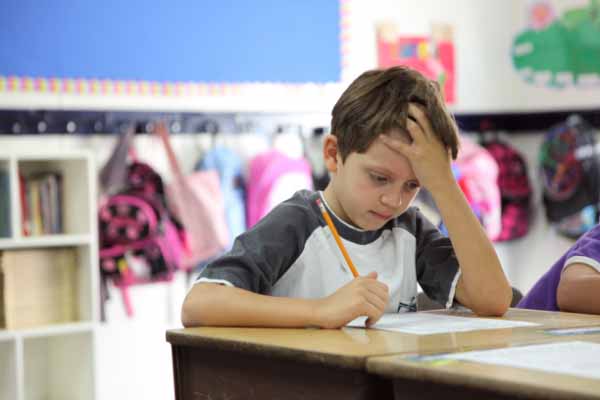
Test anxiety can be crippling, especially in states where standardized testing can take place for children as young as kindergarten. So here are some tips to help manage that stress:
Use Positive Reinforcement
Acknowledge that testing is coming up and encourage your child that they are well prepared from their studies all year but take care not to overdo it. The NYU Child Study Center says that excessive reassurance can cause an anxious child to discredit their parent’s opinion. Your child might give in to his self-doubts as a way of rebelling against your praise. Try to also avoid talking about your own experiences with testing when you were a student by saying things like “Tests were easy for me” or “I was a horrible test taker”. While it is said with good intentions, this can affect your child’s anxiety level by causing them to compare their successes or failures with yours.
Pack a Lucky Charm
Pack a “Lucky Charm” in your child’s backpack for them to have up until they step into the test room. This could be a favorite toy, a stuffed animal, or a note filled with words of encouragement. A quick squeeze of a stuffed animal right or a glance at some kind words before the test could help to calm your child.
Teach Positive Self-Talk
If you have heard your child call themselves “stupid,” say they are “just going to fail,” or put themselves down in the weeks leading up to an exam, it’s time to step in. Teach your child to use affirmations, or positive self-talk, to turn their thinking around from debilitating negative thoughts. StressFreeKids.com offers these examples of affirmations for kids to repeat in their heads while taking deep breaths before and during tests:
- “I am calm, focused, and smart.”
- “I have studied and I am prepared.”
- “I calmly trust my knowledge.”
- “I am doing the best I can, and my best is terrific.”
- “When angry or stressed, I take deep, slow breaths.”
- “I remember to breathe deeply during my tests.”
- “Breathing deeply brings more oxygen to my brain.”
- “Being calm helps me to remember more.”
- “I have enough time.”
Practice Meditation and Deep Breathing
Commanding your child to “just relax” isn’t going to help combat anxiety. The NYU Child Study Center says that relaxation is a skill that requires learning and practice, and advises keeping relaxation practices short and simple. Weave deep breathing and moments of meditation into everyday life, and make it a family affair. For example, if your child is getting frustrated with a homework question, encourage them to pause, take some deep breaths, and return to the difficult question in a moment or two.
Psychology Today advises teaching kids the “Deflated Balloon” technique — breathing slowly and deeply into the belly as if filling up their entire torso like a balloon, focusing attention a couple of inches below the belly button, which helps people feel calm and centered.
Listen to Relaxing Music or Sounds
Relaxing music and sounds can have a positive effect on your child’s nerves. Search for nature sounds and relaxing music for children on any music streaming platform. Choose instrumental songs without lyrics, which can get stuck in your child’s head or become distracting during study sessions. Listen to this music on the way to school or ask the teacher if your child can listen to it during lunchtime or breaks on testing day.
Stick with a Healthy Routine
When a big test is coming up on the calendar, try to stick with your usual bedtime and morning routine. Sleep is important as well as eating a healthy breakfast and having any materials they need for the exam. Avoid making special plans the night before the test to ensure that they get enough sleep. Then, plan a surprise fun activity for the evening after your child finishes the exams. It’s time to celebrate their success!
Testing time can be stressful for the whole family but with a fun after-school activity like Drama Kids, easing the stress can be a breeze. With fun and creative activities for children of all ages, there is a class for everyone. Contact us today for more information.
